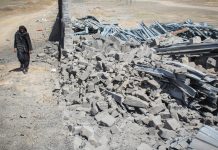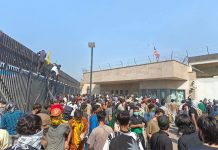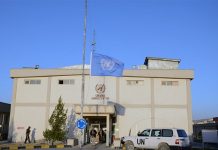The Taliban’s rapid advancement through northern Afghanistan continued on Sunday with more than a dozen districts falling in their hands. The Afghan forces, overwhelmed and terribly beaten by the advancing Taliban troops, were forced to flee to neighbouring Tajikistan to save their lives. As the United States and Britain near their complete pull-out, many fear that Afghanistan might be plunged into a terrible bloodbath.
On Friday, the United States handed over the Bagram Air Base – the hallmark of the American military presence in Afghanistan – to the Afghan forces. The massive airbase packs invaluable treasures in its walls: advanced, heavy weaponry and other ordnances, cutting-edge military equipment and up-to-date medical facilities. The Taliban have been eyeing the airbase for quite a while, but as long as the American troops were stationed there, the Taliban did not make any advancements.
But as the US left the base, the Taliban capitalized on the opportunity. The Afghan forces on Sunday said that the insurgents had mounted an attack to capture the airbase, but they were thwarted. But as the Taliban increasingly gain power in the country, Bagram Air Base, like the rest of tens of Afghan districts, might soon fall to their advancements.
On Sunday, more than 300 members of the Afghan forces were forced to flee to neighbouring Tajikistan to escape the militants. Badakhshan and Takhar, two northeastern provinces of Afghanistan, are now largely under the Taliban control, beyond their respective capitals.
The British, being an ally to the United States, has been involved in the war in Afghanistan for two decades now. As the US forces prepare to depart, handing over the country to the Afghan forces, the British are also set for a total pull-out. Many have said that the US and the British missions in Afghanistan would end by July 4th, but as Joe Biden backed away from that date, the British appear to have done the same.
US President Joe Biden was questioned in a recent press conference about the end of the US deployment in Afghanistan. He lightly brushed off the question, saying: “I want to talk about happy things, man.” His Press Secretary Jen Psaki later said that the last troops would be out by the end of August.
Britain’s ministry of defence said recently that a few British troops remain in Afghanistan. The ministry blamed the fast-changing, precarious situation in Afghanistan and “mixed messaging” for the earlier reports of a complete departure by July 4.
Britain’s plans are likely to be disclosed on Tuesday when Prime Minister Boris Johnson will reportedly address the parliament after a meeting of the National Security Council (NSC) – a Cabinet Committee entrusted with overseeing the issues related to national security, military intelligence and defence strategy. This meeting will determine the future of Britain’s diplomatic and residual military presence in Afghanistan.
But these hopes appear to be slashed once again, as sources claim that the NSC meeting has been postponed before it could even begin.
Most of Britain’s contribution to the “train and assists” stabilization mission has already left Afghanistan. The NSC meeting, if it occurs on time, will discuss if any special forces will be left in Afghanistan to guard the British embassy, a job now being done by security contractors. It is strongly suspected that the current arrangement will likely continue.
Biden’s holiday remarks on July 4th prompted outrage in Afghanistan among the local population who already feel repressed and overwhelmed by the increasing Taliban control in the country. “As an Afghan woman, I don’t have that option ‘to talk about happy things’. I have to worry about a looming gender apartheid,” Shaharzad Akbar, the head of the Afghanistan International Human Rights Commission, said on Twitter.
Afghan civilians have numerous reasons to worry. More than a third of Afghanistan is now under Taliban control. Several key provincial capitals, even though not under Taliban control per se, are surrounded by them. Afghan districts are falling like dominoes to the rapidly advancing Taliban troops. In areas, the Afghan security forces have surrendered to the Taliban, many in deals brokered by the local elders. Videos on social media show the Taliban leaders hugging Afghan soldiers and giving them money to return home. Clips like these have given confidence to the Afghan forces that they can abandon their posts without losing their lives.






























